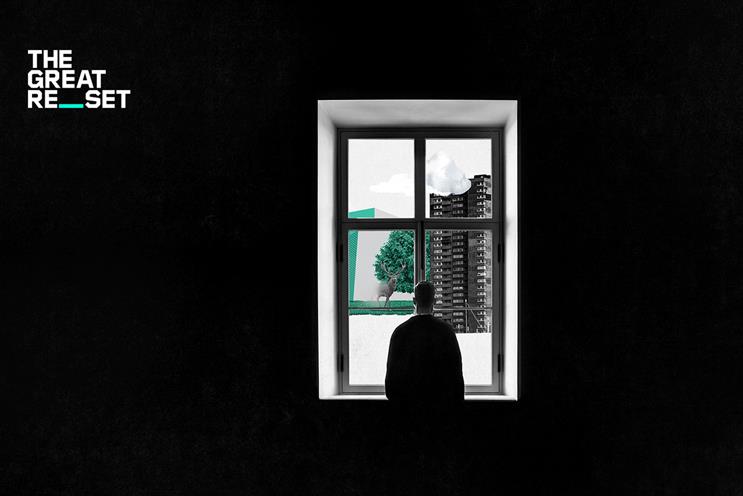This month, hundreds of ad folk came together to launch The Great Reset, a movement to use our industry’s power and creativity to promote sustainable living.
In the cut and thrust of marketing communications, putting our planet first has sometimes been seen as wide-eyed naivety. On the contrary: at this unique moment in time, it offers our best possible business advantage.
In the past couple of years, the world of corporate sustainability has been in acceleration mode. Last year, the UK government passed a law requiring everyone to become "net zero", meaning no carbon emissions, by 2050. Our clients have been busy heeding the call. Three of the UK’s top five spenders – Sky, BT and Unilever – aim to be net zero by 2030, 2039 and 2045 respectively.
So where are we in all of this? While clients are bedding in to the brave new world of net zero, footprinting and carbon sequestration, we’re still learning the language. We’ve also been notably quiet in making our own net-zero commitments as an industry. It’s as if the world of sustainability is too "left-brained", too scientific and technical for creativity to take on. This is a huge blind spot. Lacking fluency, we’ve been kept too far downstream in these vital sustainability conversations.
Of course, the absence of creativity has other consequences. A quick Google shows the problem: living sustainably still looks like wind-farm clip art, lime-green recycling logos and smiling planet Earths. When a net-zero brief finally filters down to a creative agency, we lament the qualitative results that reveal people are "turned off" by language such as "sustainability" and "net zero". We know these stories aren’t connecting. But without upstream involvement, we haven’t had a chance to write new ones.
The pandemic has blown this wide open.
The door to creativity is open
For the first time in our lives, everything stopped. And through a strange glitch in reality, we got to have a trial run at real sustainable living. We only bought what we needed and were surprised at what we didn’t miss (April saw a 22% reduction in retail sales). We started scratch cooking and composting and using leftovers (48% claimed to throw away less food). We marvelled at car-free streets and enjoyed cycling. We got emotional about birds.
This was the once-technical world of a low-carbon future made flesh. Our abstracted journey towards net zero became something we could feel, taste and hear ourselves. One that we enjoyed – even in the height of lockdown, only 9% wanted life to return to "normal". Incidentally, lockdown is predicted to result in a 7% decrease in global emissions for 2020. (As if by some cosmic nudge, this is almost exactly the same figure – 7.6% – we’re required to reduce our emissions, every year till 2030, to be on the path towards net zero.)
Amitav Ghosh said: "The climate crisis is also a crisis of culture, and thus of the imagination." Lockdown made this patently clear. Cowed by the technical authority of the net-zero story, we’ve been inhibited from imagining a richer, more human story about the kind of world we want to live in. Life in lockdown has shown up the stories that do connect. Like the new tomato plants in our window boxes, these are real, felt memories and ideas, now living in the active imaginations of 60 million Brits.
Our audience doesn’t want to lose this. Seventy-seven per cent of people think it is the creative industry’s responsibility to encourage people to behave more sustainably, as we have during lockdown. Only 23% of the population believe post-lockdown advertising should encourage people to consume, shop and fly like before.
This is our turf
As an industry with immense power to shift perceptions, we have some responsibility to uphold this new societal shift. But there is equally a business advantage. Lockdown has brought a new, felt dimension to the sustainability story. This is now a matter for the heart, as well as the head. And the heart is our turf.
So we need to assert ourselves. We are now critical partners in corporate sustainability. As more corporations join the journey to a net-zero future, technical expertise is vital. But also essential is the contribution of creativity and imagination in exploring what it looks and feels like to live sustainably and telling stories that connect to our deeper humanity. It’s not the McKinseys that can do that. It’s us.
Of course, this logic applies more broadly. Navigating any kind of chaos requires creativity and imagination. But our particular breed of 2020 chaos is different. It’s deep, gutsy, bone-felt chaos; it’s about living in vulnerable human bodies and how the colour of our bodies matters and how we attend to the world. It dredges up our deepest fears and most audacious hopes. As a result, our best clients are not just tweaking their carbon commitments or their diversity and inclusion statements. They’re soul-searching on a different scale. And soul matters are not for management consultants. They’re for creatives.
Ally Kingston is strategy director at Gravity Road
This article was inspired by The Great Reset: Reshaping the Marketing Industry to Serve People and Planet, a white paper co-authored by Kingston and Thinkbox’s Laura Costello, with contributions from Purpose Disruptors, Iris, McCann Manchester, Starling Strategy and Regent’s University London


